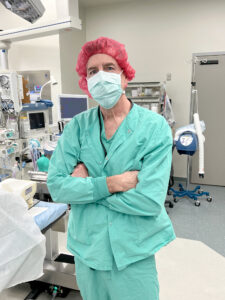
I am a medical device sales rep. I spend my days in doctors’ offices and operating rooms, trying to convince healthcare providers to use my company’s products and then assist in any way I can to make sure the procedure they are doing goes well and there are no issues relating to my device. It is a tough job, but I am good at it. I know the medical lingo, I know my device and how it is used, I can talk the talk, and I can close a deal.
But after a few years (20!), I started to get bored. I was tired of the same old routine, and I was starting to feel like I wasn’t making a difference. The thought of being on-call 24/7/365 was getting old too. And, I wanted to do something more meaningful with my writing skills.
So, I decided to make a pivot. I added the role of a freelance medical writer to my bag. It was a risky move, but it was the best decision I ever made.
I now get to mostly work from home, I set my own hours, and I write about topics that I’m passionate about. It’s the perfect job for me.
But it wasn’t always easy. When I first started out, I had to learn a lot on the fly. I had to learn how to research medical topics, how to write in a clear and concise way, and how to format my documents according to industry standards.
I also had to learn how to market myself and find clients. It took a lot of hard work and perseverance, but eventually, I started to get some traction.
Now, I’m working with a number of different clients, and I’m getting to write about some really interesting topics. I’ve written about everything from new medical treatments to the latest research on the predictive capabilities of Artificial Intelligence (A.I.) in Total Joint Arthroplasty.
I’m also starting to get involved in the medical writing community. I’ve joined a few professional organizations, and I’m starting to network with other medical writers.
It’s not been a long journey. I am just scratching the surface of the opportunities out there, but I’m so glad I made the decision. It’s the perfect job for me, and I’m so excited to see what the future holds.

Here are some of the (not so) funny things I’ve learned along the way:
- Medical jargon is a lot of fun to say, but it can be really hard to write.
- It’s important to know the difference between a contraindication and a precaution.
- You can’t just make stuff up. Everything you write has to be backed up by evidence.
- Sometimes, you have to write about really boring topics.
- But even the most boring topics can be made interesting if you know how to write about them.
If you’re thinking about becoming a freelance medical writer, here are a few tips for you:
- Get a good education. A degree in a science or medical field will give you a good foundation in the medical sciences.
- Learn how to write well. Medical writing requires clear, concise, and accurate writing.
- Get experience. There are a number of ways to get experience in medical writing. You can take online courses, volunteer your writing services, or get a job as a medical writer’s assistant.
- Network with other medical writers. There are a number of professional organizations for medical writers. Joining one of these organizations is a great way to meet other medical writers and learn from their experiences.
I hope this blog post has inspired you to consider a career in medical writing. It’s a great field with a lot of opportunities. And it’s a lot of fun!
If you are looking for a writer, please visit my website and check out my samples page. www.jjcwrites.com
